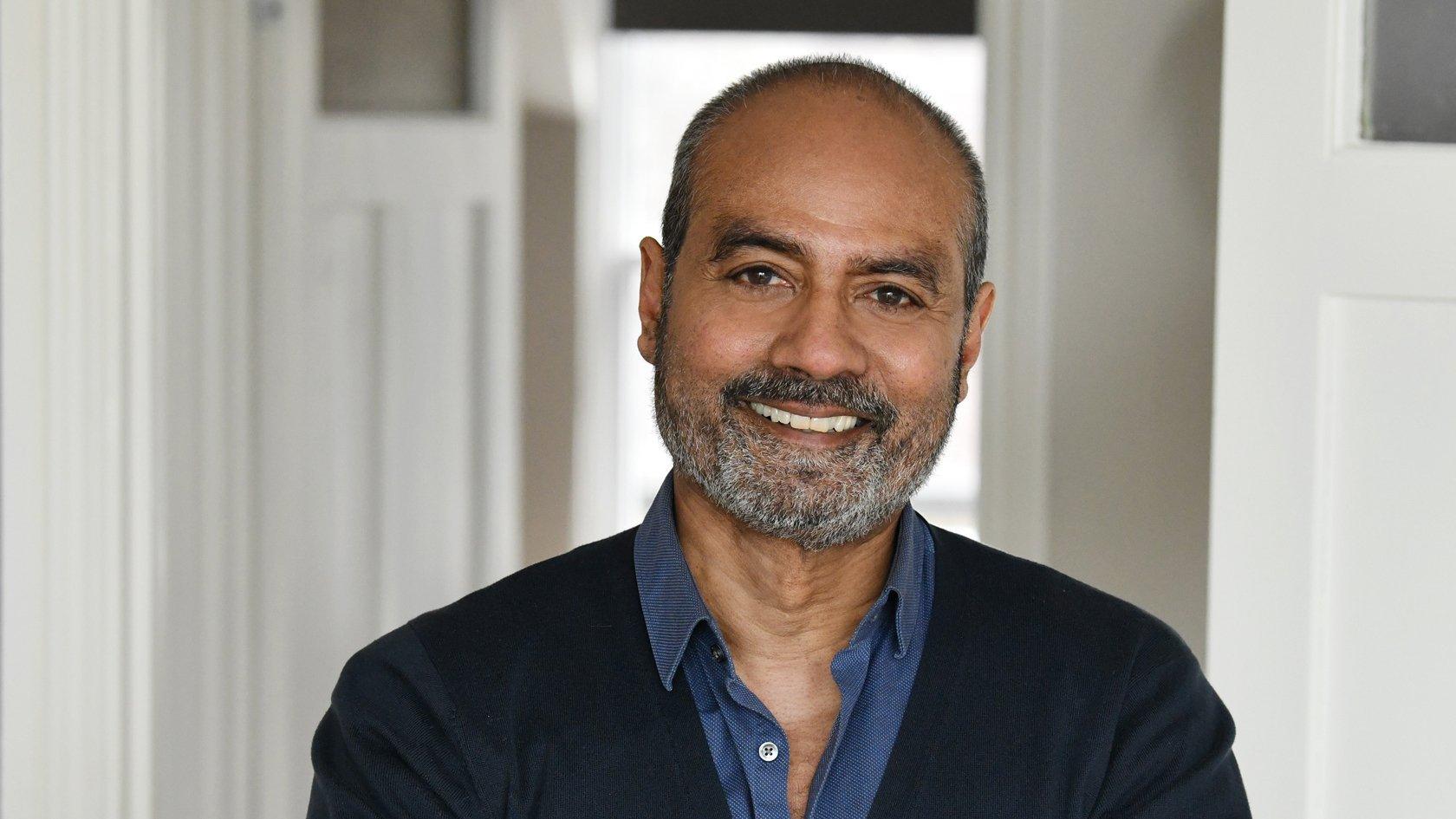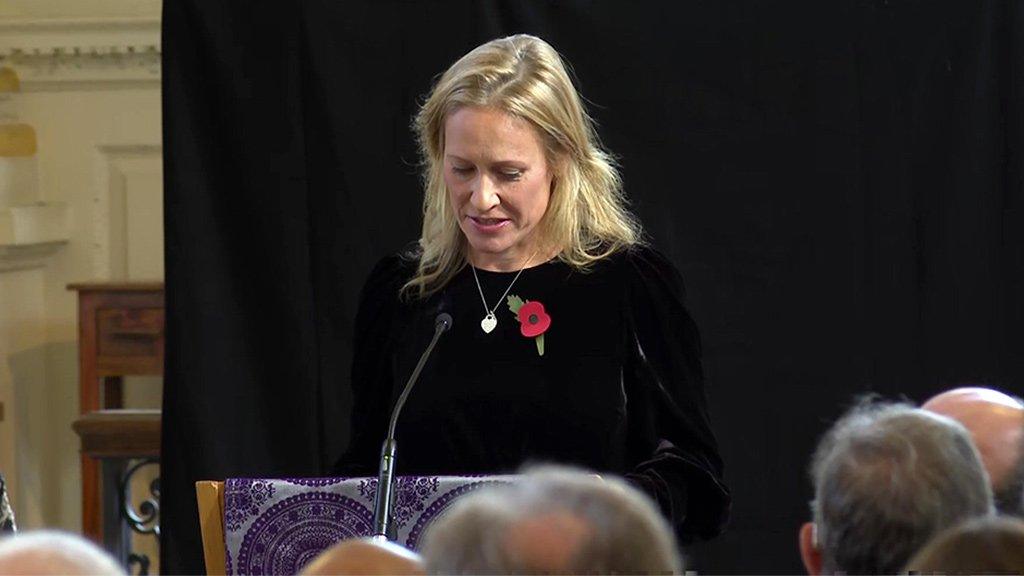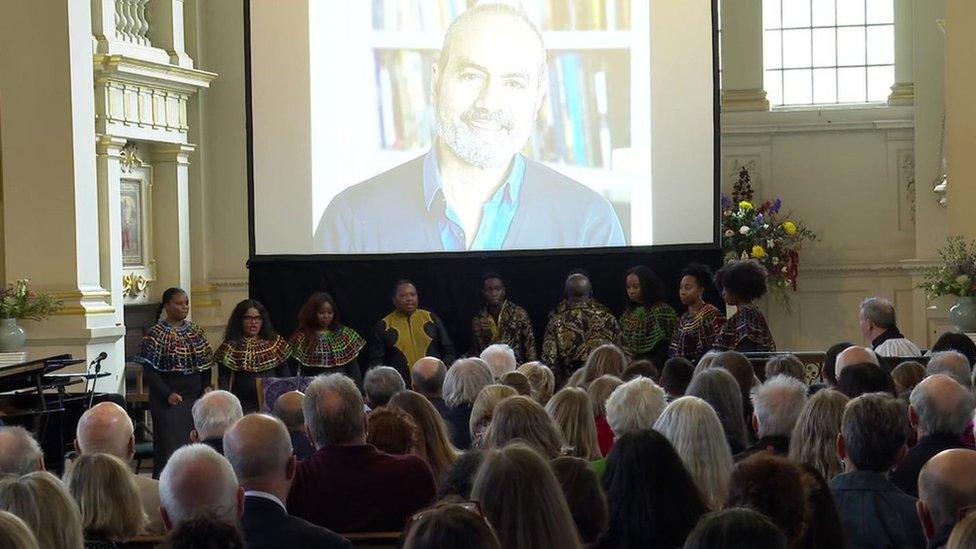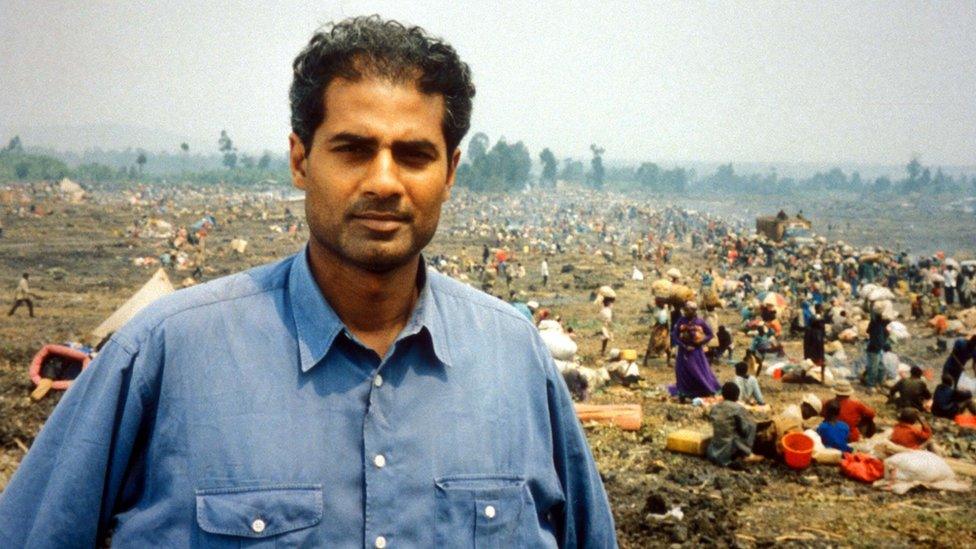George Alagiah's moving words written for his own memorial
- Published

Over three decades, George Alagiah was a familiar and much-loved presence on British screens
Hundreds of people attended a memorial service for BBC News presenter George Alagiah, who died in July. Colleagues and family members alike paid tribute to one of British television's best-loved figures.
On 7 July 2023, three weeks before he died, George Alagiah dictated to his wife Frances the words he wanted to be read aloud at his memorial.
"It is a painful yet exclusive luxury to be living with cancer because for the most part it is a story of a death foretold," he began. "Many of us cancer patients know that our time is running out so there is time for reflection. It is not the brutality of a car crash."
Nearly four months later, 800 of George's friends, colleagues and family members listened as Sophie Raworth, his former BBC Six O'Clock News co-presenter, shared his final thoughts with the world.

Sophie Raworth read a message written by George Alagiah himself
It was, for everyone present at St Martin-in-the-Fields church, near London's Trafalgar Square, a deeply emotional moment. The congregation had gathered to remember one the BBC's longest-serving and most highly respected journalists - an award-winning foreign correspondent and a fixture on BBC News for three decades.
But everyone in the church knew George Alagiah was much more besides - a devoted husband, father, grandfather, brother and friend. And during the service of celebration, colleagues and loved ones alike spoke of his most human qualities - his empathy, compassion and kindness.
BBC special correspondent Allan Little, who worked with George at the BBC's Bureau in Johannesburg and was a close friend, described a ground-breaking reporter who was instrumental in bringing diverse perspectives to the BBC's newsroom.
"In his reporting there was always the outstretched hand of a shared humanity," Little said. "George wasn't just a good reporter, he was also a good man."

The service began with the London African Gospel Choir performing Nkosi Sikelel' iAfrika
The service began with the London African Gospel Choir performing Nkosi Sikelel' iAfrika - a song which, when George began covering South Africa in the 1980s, risked a jail sentence for anyone who sang it. Today it is part of the national anthem. Such was the enormity of the events to which George had faithfully borne witness, said the vicar of St Martin-in-the-Fields, The Rev Dr Sam Wells.
George Maxwell Alagiah was born in Colombo, Sri Lanka - then called Ceylon - on 22 November 1955, before his family moved to Ghana in the wake of ethnic unrest. He and his siblings were later educated in England.
His sisters, Mari Martin, Rachel Stojan, Chris Dennington and Jenny Johnson, spoke of the profound impact of these migrations on their childhoods. "Our parents must have instilled in us a sense of adventure," Mari said, "because we never felt fear or trepidation."
But this did not come without hardship for George. The congregation heard how he later wrote about the racist bullying he received at his boarding school in Portsmouth, as well as the dawning of his belief that the UK was a country where "class trumps race every time".

George Alagiah reported from Rwanda in 1994
The service heard stories, too, of George's days at Durham University, where he met Frances and made lifelong friendships. George's sons, Adam Alagiah-Glomseth and Matthew Alagiah, read passages from their father's books.
On a screen, a montage of photographs showed George at work around the world and at home with his family. It was accompanied by Steve Rosenberg, the BBC's Russia editor, on piano. Later, Natasha Kaplinsky - also once George's Six O'Clock News co-presenter - read Maya Angelou's When Great Trees Fall.
"To a whole generation of audiences, he was the very best of us," BBC director general Tim Davie told all those present.

George Alagiah remembered

At the very end of the order of service, the following item was scheduled: "A final round of applause for George; exactly one minute; cheering allowed."
Allan Little implored congregants to do as suggested and make as much noise as possible. "For precisely 60 seconds, take the roof off St Martin-in-the-Fields," he said.
They obliged. For somewhat longer than a minute, the church thundered with the sound of applause.
And as the congregation left the building, they carried with them George Alagiah's own words, as read by Sophie Raworth.
He had left them all the following instructions:
"If you haven't already told the people you love that you love them, tell them;
"If you haven't already told them how vulnerable you sometimes feel, tell them;
"If you want to tell them that you'd like to be with them until the front hall stairs feel like Everest, tell them.
"You never know what is coming around the corner.
"And if, lucky you, there is nothing around the corner, then at least you got your defence in first."